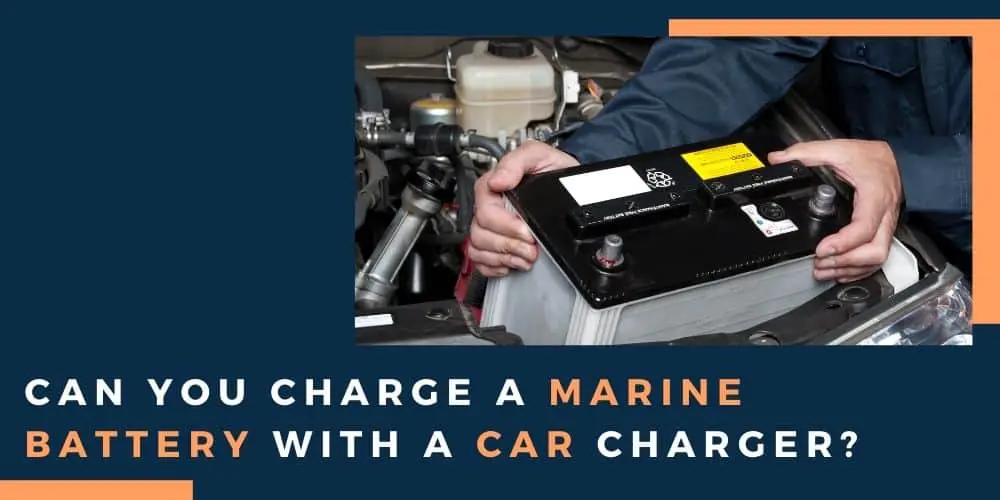Lots of people like to tinker, taking things apart to see how they work, creating hybrid technologies at home for personal use… it’s an addiction, frankly, and one of the few good kinds.
One thing that you might be wondering if you own a boat is this – Can you charge a marine battery with a car charger?
The good news is that yes, you can, though it might take some time depending on your charger and your battery. The bad news is, that we don’t really recommend it.
Today we’re going to talk about how you can charge your marine deep cycle battery with a car charger and we’ll give you some steps and tips on the charging process, as well as a quick explanation of the dangers of under and overcharging.
We’ll begin with the reasons why using a car charger on your marine deep cycle battery is not something you want to make a regular practice of.
Contents
Why a car charger is not recommended for a Marine deep cycle battery
When you are charging a deep cycle battery it is always best to use a charger designed specifically for that purpose.
That’s because these chargers will typically employ multi-stage charging, which is faster, more efficient, and isn’t going to result in a dangerous overcharging incident that could destroy your battery.
With a car charger, depending on how it is rated, you run into potential problems such as ‘trickle charging’ settings being too low to be of much use or the big problem, the risk of overcharging.

Since you are using a charger that is not designed for a deep cycle battery you would have to watch and consistently check the voltage throughout the charging process.
If you were to hook up your battery to a car charger and leave it overnight, the results could even be disastrous without a voltage-regulation feature there to stop it when it’s fully charged.
Since your deep cycle battery uses a suspension of electrolytes in distilled water, if this gets dried up the plate can get damaged and void your warranty.
Proceed with caution.
Steps for charging your Marine deep cycle battery with a car charger
If you have charged a marine battery with a non-smart charger before then the steps are going to be essentially the same. You will want to get your Hydrometer ready, a voltmeter, and your gloves and goggle. Then you may proceed with the following steps:
- Make sure that the battery is disconnected/switched off and cleaned properly
- Glove and goggle up, then make sure that the area is well-ventilated due to gas release possibility from the battery
- Check the fluid level with your hydrometer to make sure that you don’t need to top it off with distilled water (you probably don’t but always check)
- Check your current voltage
- Now attach your 10 amp 12 volt car charger (a 5 amp will be insufficient). Clamp the positive terminal first and then the negative.
- Double-check your car charger manual in case they happen to include a deep cycle setting you may employ, if so then use it, but otherwise you can plug in the charger and start the charging cycle.
- You will want to check the voltage every hour in order to ensure that you do not overcharge the battery. This is a big caveat of using a charger that is not rated for your battery but you need to do this.
- Depending on how many amps your marine battery is rated for, this is a process that can potentially take all night, so keep this in mind. It might be worth it to pick up your regular charger or even to purchase a new smart charger.
Once you have reached your full charge then you can disconnect and you are done. While you can charge a marine deep cycle battery with a car charger, as you can see it is not something that you will want to do regularly.
Save the process for an emergency, otherwise it really is best to use a charger that is specifically meant for your marine battery.
Be careful not to overcharge or undercharge
Finally, we just want to stress that this type of charging is makeshift at best and if you end up employing it with any regularity you should be aware of the dangers of over or undercharging.
These apply even with the proper charger, though with overcharging and smart chargers this is generally a non-issue. Smart chargers can shut themselves off when the process is complete.
Undercharging is bad because of a process known as Sulfation. During the normal process of using and charging your battery a collection of sulfate crystals can start to build up inside of the battery.
When charging is done at irregular times or simply not enough, these crystals can become more stable and then they can compromise your battery’s ability to hold a charge. This is a slow, but definitely undesirable process.
Overcharging, by contrast, can stress that suspension of water and electrolytes and even dry out cells, burning out a battery overnight if you are charging with a portable charger that doesn’t employ voltage regulation.
Some closing advice
Can you charge a marine battery with a car charger? You certainly can, but you really want to get yourself a good smart charger.
They use a 3-stage process that makes them recharge quickly and more efficiently. You’ll extend your battery’s lifespan, saving you money, and it will turn itself off when it is done, saving you time.
It just makes good sense!






